Organic Jaggery powder – avalue added business venture
Background
Jiggery is a pure, traditional, unrefined form of sweeteners. Jiggery production in india is about 7-10 mt/year while its per capita consumption is about 5 kg. compared to sugar, jiggery gives good return to the farmers if the market price is higher. In this situation, taking up jiggery production as a small scale business will be a profitable one. Further, profit may be many fold it is produced organically or value added. By realizing the fact, a farmer from puliangudi of Thirunelveli district is producing organic jiggery powder and stelling in local markets as well as in export market and earning a good profit.
Organic jiggery powder as a small scale business venture
Normally jiggery can be produced in different shapes. Shri. Anthonisamy from Puliangudi of Sivagiri Taluk, Tirunelveli district thought of producing jiggery powder. He cultivates Co 86032 sugarcane variety from the time of its release and practicing organic farming. Organically grown sugarcane is crushed and juice is extracted. The extracted juice is filtered and boiled without adding any chemicals. After removing the scum, the juice is further condensed till it becomes semi – solid and removed from the furnace. The semi-solid paste is cooled in a wide pan and scraped using wooden ladle to prepare organic jiggery powder. It has got greater demand in local area as well as in nearby states besides fetching higher prices.
Cost-benefit analysis
The farmer says “the organic jiggery powder has good taste and more sweetener than others”. He sells one kg jiggery @ Rs.75, whereas, the normal rate of one kg jiggery in the commercial market is around Rs.50. further, he reported that the production cost of one kg jiggery powder including the cane cost is only Rs.30.
Scope and utility
The demand for jiggery is steadily increasing in urban, semi urban and rural areas. Market for jiggery is round the year, whereas, its production is only seasonal.Value added jiggery products viz., jiggery powder, organic jiggery, different flavored jiggery like chocolate, coconut are getting good demand among the consumers.Most of the organic products is properly certified by the organic certifying agency. Then the demand for the product will be many folds among consumers.
 |
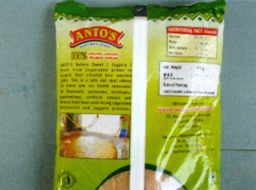 |
| Organic sugarcane Field |
Organic Jaggery Powder |
Bud chip settling production as small scale business venture
Background
Sett planting is a common practice in sugarcane cultivation. But it recent times, bud chip settling method is getting momentum among farmers. Bud chip settling production was originally invented for seed multiplication and breeder seed production. But over a period of time, it is being utilized as a planting material. Bud chip settling production involves several steps and is a labour and time consuming practice. Hence, all the farmers can’t take up their own production for their requirement and they have to depend on sugar factories or private producers. By seeing this opportunity, several farmers are taking up the bud chip settling production as a small scale enterprise. Shri.Mohanraj from Ramapuram village of Erode district is one among them.
Bud chip settling production
Ramapuram is a small village in Thalavadi Taulk of Erode District of Tamil Nadu. It is located 108 km towards west from Erode. Shri. Mohanraj from the village is taking up the bud chip settling production as a small scale business. He maintains a separate unit to produce bud chip settlings. He is employing three women labourers and has constructed a green net house for this purpose.
The buds are scooped from cane by bud chipper and the chipped buds are placed in pro-trays filled with coir pith. One pro-tray has the provision to keep 50 buds. The trays are placed one above and covered with gunny bags for a week. After a week, the sprouted buds with trays are transferred to green net houses and kept for three weeks with regular watering.
Cost –benefit analysis
For one acre, the sugarcane settlings requirement is 5000 Nos. total expenditure incurred for various operations viz., scooping of buds, placing the buds, tray cost, green net cost is around 60-85 paisa/settling. Selling cost of one month old settling is Rs.1.25. thus, the farmer gains a net profit of 40 paisa per settling. He produces settlings on demand basis. Before taking up the production, he assures the demand from factory and decides the required seedlings to be produced. So, he avoids market risk as well.
Scope and utility
In recent times Government of Tamil Nadu is promoting Sustainable Sugarcane Initiative (SSI) in a larger scale during recent times. Under the project, bud chip settling one of the major recommendations. Hence, the demand for bud chip settlings is many fold. Sugar factories are encouraging the farmer to take up settling production as a small scale business venture. The entrepreneurial interested farmers are identified by the factory personnel and hands on trainings about bud chip settlings are arranged for them. After the training, farmers produce bud chip settlings and selling to factories on contract basis. Both the stakeholders viz, farmers and factories gets benefit out of it. Farmers can earn money thorough the business and the factories are getting settlings on time to distribute to the other farmers in the area.
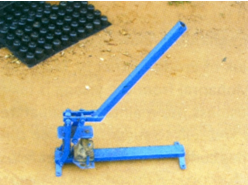 |
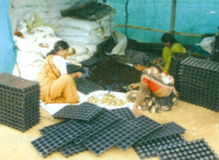 |
| Bud Chipper |
Buds chips are placed in pro-trays |
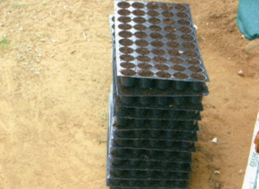 |
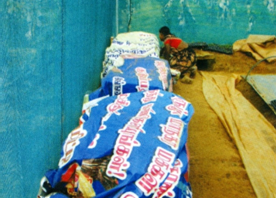 |
| Filled trays |
Trays covered for sprouting |
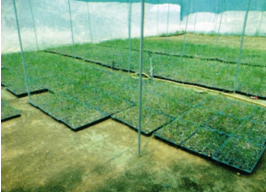 |
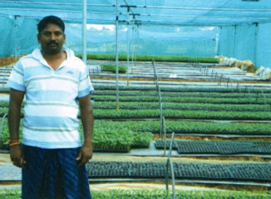 |
| Sprouted settlings in shade net |
Settlings are ready for transplantation |
Sugarcane based vermin-compost production and organic agriculture
Background
After cane harvest, a huge amount of trash is obtained and it is un or underutilized. Disposal of trash and other residues is difficult and could become a serious problem, if it is not disposed-off properly. By using earthworms, the residues can be converted into effective manure. The process of producing valuable manure from the farm residues with help of earthworms is called “Vermi-composting” and the maure is called vermin-compost. In general , vermin-compost can be prepared from all types of organic residues. Sugarcane trash based vermin-compost preparation has been documented from a farmer of the panikampatty village and he undertakes the venture as a small scale business.
Vermicompost- a business opportunity in organic agriculture
Shri.Gopalakrishnan, a farmer from panikampatty village of Erode district produces sugarcane trash based vermin-compost for the past five years. Sugarcane trash, pressmud, cow dung, neem leaves, molasses and other farm wastes are spread on the floor in layer and Azospirillum and Phosphobacterium are sprinkled over it. The heap is allowed for 20 days for decomposing. After 20 days, earthworms are released and watered at 3 days intervals to maintain adequate moisture. After 2-3 months, compost will be ready. The upper portion of the heap is collected and stored and the lower portion is sieved to separate earthworms. After separating the earthworms, the compost is packed.
Cost-benefit analysis
The farmer reported that one tone of farm residues yield about 250 kg of vermin-compost. To produce 250 kg of vermin-compost, the cost incurred under different heads viz, earthworm, pressmud, transport, labour, Azospirillum and Phosphobacterium is around Rs.750. in total cost, major portion goes towards labour costs. Selling cost of one kg vermi-compost is Rs.5. hence, the farmer gets a gross income of Rs.1250 form 250 kg of vermin-compost and a net profit of around Rs.500. apart from vermi-compost, he is producing fish ensilage, lime egg solution and panchagavya and selling these products in the local market in the brand name of “En G Key”. He say ‘by selling these organic produce, I am earning Rs.20,000-30,000/month as an additional income apart from sugarcane cultivation”.
Scope and utility
Vermi-comppost is and integral part of organic agriculture. Demand for vermin-compost is more among the farmers. Majority of the farmers are not able to take up the vermin-compost production for their own requirement, as it requires more time and labour. Bud farmers are ready to apply vermin-compost in their field if they get it on cost basis. Ever they are ready to pay Rs.7000-8000/tone. Hence, this entrepreneurial avenue have greater scope for further exploration. Ever they are ready to pay Rs.7000-8000/tone. Hence, this entrepreneurial avenue have greater scope for further exploration. Ever they are ready to pay Rs.7000-8000/tone. Hence, this entrepreneurial avenue have greater scope for further exploration. Ever they are ready to pay Rs.7000-8000/tone. Hence, this entrepreneurial avenue have greater scope for further exploration. Ever they are ready to pay Rs.7000-8000/tone. Hence, this entrepreneurial avenue have greater scope for further exploration.
|

